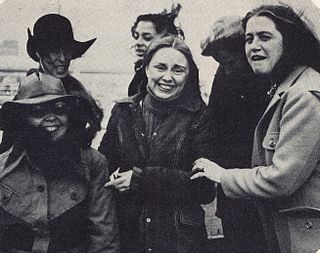 W
WThe Clichettes were an all-women feminist performance art group formed in Toronto, Canada in 1977. Their practice is notable for injecting humour and theatricality into the sphere of performance art. The three performers initially worked using lip sync and choreography as their tools to parody pop culture depictions of femininity and later expanded their practice by including elements from science fiction and theatre in their performances. The Clichettes are notable for their impact on Canadian performance art as well as Feminist and performing arts in general.
 W
WFeminist art is a category of art associated with the late 1960s and 1970s feminist movement. Feminist art highlights the societal and political differences women experience within their lives. The hopeful gain from this form of art is to bring a positive and understanding change to the world, in hope to lead to equality or liberation. Media used range from traditional art forms such as painting to more unorthodox methods such as performance art, conceptual art, body art, craftivism, video, film, and fiber art. Feminist art has served as an innovative driving force towards expanding the definition of art through the incorporation of new media and a new perspective.
 W
WThe feminist art movement in the United States began in the early 1970s and sought to promote the study, creation, understanding and promotion of women's art. First-generation feminist artists include Judy Chicago, Miriam Schapiro, Suzanne Lacy, Judith Bernstein, Sheila de Bretteville, Mary Beth Edelson, Carolee Schneeman, Rachel Rosenthal, and many other women. They were part of the Feminist art movement in the United States in the early 1970s to develop feminist writing and art. The movement spread quickly through museum protests in both New York and Los Angeles, via an early network called W.E.B. that disseminated news of feminist art activities from 1971 to 1973 in a nationally circulated newsletter, and at conferences such as the West Coast Women's Artists Conference held at California Institute of the Arts and the Conference on Women in the Visual Arts, at the Corcoran School of Art in Washington, D.C..
 W
WCarolyn Gage is an American playwright, actor, theatrical director and author. She has written nine books on lesbian theater and sixty-five plays, musicals, and one-woman shows. A lesbian feminist, her work emphasizes non-traditional roles for women and lesbian characters.
 W
WInternationalist Theatre is a London theatre company founded by South African Greek actress Angelique Rockas in September 1980. The company was originally named New Internationalist Theatre, with an intention to pursue an internationalist approach in its choice of plays as well as "a multi-racial drama policy, with an even mix of performers drawn from different cultural groups".
 W
WScarlet Harlets was a women's theatre company based in London in the 1980s; it later changed its name to Scarlet Theatre. The company created physical theatre productions through a process of collaboration between the actors, the scriptwriter or translator, and the director.
 W
WThéâtre Espace Go is a theatre in Montreal, Quebec, Canada. Founded in 1985 as the feminist Théâtre Expérimental des Femmes, the company changed its name to Théâtre Espace Go in 1994 and broadened its mandate.
 W
WThe Westbeth Playwrights Feminist Collective was a group of professional women playwrights in New York active from 1971 to 1975. They wrote and produced feminist plays and were one of the first feminist theatre groups in the United States to do so. The members' individual works had been produced at the Public Theater, La Mama, Joe Chaikin’s Open Theater, Caffe Cino, Circle Repertory Company, Mark Taper Forum, Lincoln Center, and New York Theater Ensemble.